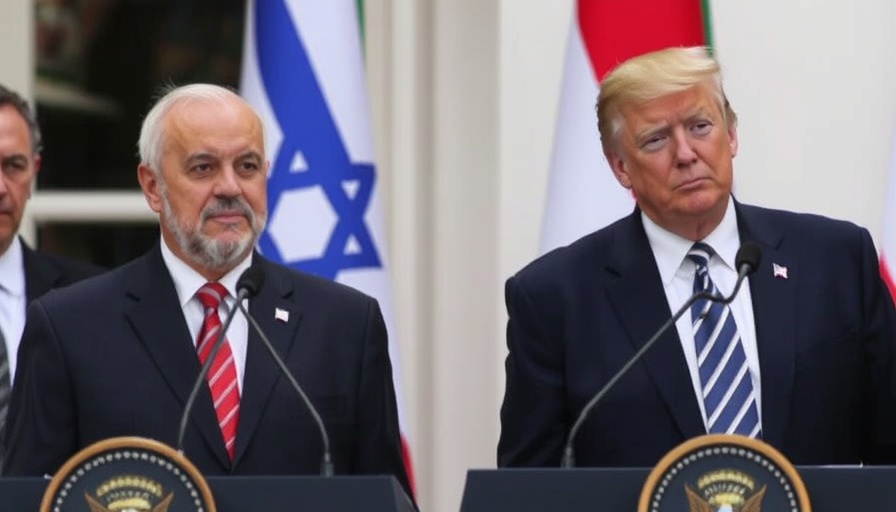
Escalation at the G7: Trump Cuts Summit Short Amid Tensions
In an unexpected decision, President Trump is set to leave the G7 summit in Alberta, Canada, one day ahead of schedule due to the intensifying conflict between Iran and Israel. Trump's early departure highlights a rapid shift in focus for the U.S. as tensions in the Middle East escalate, leaving both world leaders and the public to ponder the implications.
Understanding the Context
The Israel-Iran conflict has seen significant escalation in recent days, following Israel's military actions aimed at dismantling Iran's nuclear capabilities. In an alarming twist, Trump took to Truth Social to issue an evacuation order for residents in Tehran, exacerbating concerns over potential military engagements. His warning came closely on the heels of Israeli airstrikes targeting what it claimed were military infrastructures in Iran.
Implications of Trump's Departure
Trump's decision to exit the summit early poses challenges for G7 leaders who were keen on reaching a consensus regarding the conflict. Notably, the U.S. was expected to sign a statement advocating for de-escalation, emphasizing that Iran's nuclear ambitions must be curbed. The G7 meeting had already aimed to address pressing issues, including a potential negotiated deal referencing Iran's nuclear program. Trump's abrupt exit may hinder collective efforts.
What This Means for U.S. Involvement
The rapid developments surrounding the Israel-Iran conflict raise questions about the U.S.'s role. Trump's ability to mediate discussions has been tested as regional tensions continue to surge. Expressing a sentiment of impending negotiations, he noted, "It’s always better to talk in person." His comments suggest that diplomatic efforts could be on the horizon, dependent on the outcomes of discussions held before he returns to Washington.
Future Predictions and Insights
As events unfold, analysts are increasingly concerned that the current conflict could have broader implications for international security. The prospect of escalated military actions against Iran raises fears about a potential regional war. Experts warn that U.S. involvement could dramatically alter the balance, with repercussions felt far beyond the Middle East.
The Human Cost: Voices from the Ground
For many in Iran and Israel, the ramifications of this conflict are dire. The evacuation orders signal not only military urgency but also a growing humanitarian crisis. Civilians in affected areas face uncertainty and fear as missile strikes intensify. The call for peaceful negotiations is echoed by the voices of those caught in the crossfire, demanding stability and safety amidst chaos.
Counterarguments: Peace Efforts vs. Military Actions
While some advocate for stronger military strategies to deter Iran's nuclear ambitions, others push for diplomatic solutions. Analysts emphasize the risk of further conflict, particularly as Israeli Prime Minister Netanyahu makes incendiary remarks about targeting Iranian leadership. Balancing military assertiveness with dialogue is crucial to avoid a deadlock in negotiations.
Common Misconceptions and Myths
Amid the ongoing media coverage, several misconceptions persist regarding the motivations behind the Israel-Iran conflict. Some interpreters suggest that the escalation is purely about terrorist threats; however, deeper political and historical roots reveal a complex landscape involving territorial disputes, historical grievances, and the pursuit of nuclear capabilities.
Tools for Understanding Geopolitical Tensions
The situation calls for heightened awareness of global interdependencies. Essential resources for tracking such complex conflicts include international news outlets, expert analyses, and diplomatic communications that can help the public understand the nuances and stakes involved.
Risk Factors Ahead
A key risk factor in this conflict is the potential for miscalculations that might spiral into a larger war. With both countries conducting military operations and making bold statements, there is an urgent need for de-escalation measures. Continued scrutiny of military strategies and diplomatic tactics will be crucial in the days leading up to further developments.
As attention shifts back to Washington and future peace talks, many stakeholders are left wondering about the ramifications of Schumer's departure from the G7 summit, and what it means for both U.S. foreign policy and the stability of the Middle East going forward.
 Add Row
Add Row  Add
Add 




Write A Comment